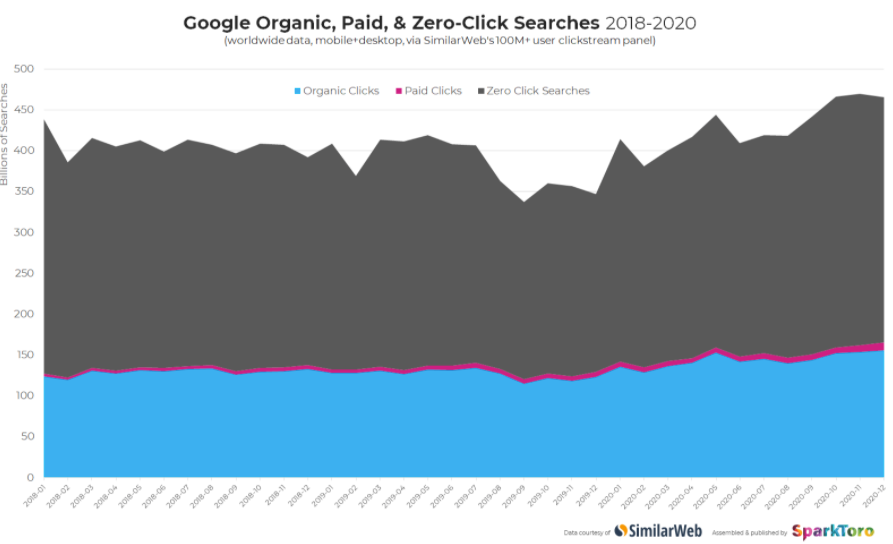Local Zero-Click, 1-Star Speech, Antitrust Guerilla

Does Local Dominate 'Zero-Click' Search?
According to SimilarWeb data, analyzed by Rand Fishkin, nearly two-thirds (65%) of Google searches "ended in the search results without clicking to another web property." The figure is larger for mobile (77.2%) than desktop (46.5%). Zero-click search as a phenomenon has been around for several years. It's a misnomer; the user may be engaging with – and clicking on – Google content (e.g., Travel results, Local Pack, Shopping, Snippets) but just not visiting an underlying website. In August of 2019, zero-click search was just over 50%. That was based on US data from Jumpshot. The SimilarWeb data is global, meaning the phenomenon (or problem) is worldwide.

Our take:
- One under-appreciated part of the zero-click debate is local search.
- Mike Blumenthal and Joy Hawkins report a majority of conversions (75%+) in some categories are "zero-click" from the Local Pack (i.e., calls, directions).
- This thesis supports why mobile has a higher % of zero-click searches than desktop: a higher % of mobile queries carry local intent.
Cicilline's 'Guerilla' Approach to Antitrust
Democrat David Cicilline, who's in charge of antitrust legislation in the US House of Representatives, has revealed his strategy to take on big tech companies. Rather than a single, comprehensive bill, he's planning a series of smaller and more narrowly tailored bills – as many as 10 or more – that would, in his words, be harder to defeat by lobbyists for Google, Facebook, Amazon and Apple. He told Axios that in addition to being more difficult for tech companies to combat, he's got "a better chance of finding common ground between Democrats and Republicans" on discrete issues rather than sweeping legislation.
Our take:
- I'm reminded of The Empire Strikes Back, where the rebels bring down "Imperial Walkers" during the Battle of Hoth.
- It's not clear how all these legislative pieces might fit together into a more complete regulatory framework.
- Now that Cicilline has telegraphed all this to big tech, they may formulate strategies to deal with his "guerilla" approach.
Court: 1-Star Competitor Rating Not Defamation
A lawyer in Michigan received a wordless one-star review from a likely "malicious competitor." He sued for defamation and lost (Gursten v. Doe). The court dismissed the claim, saying: "as a matter of law, a one-star wordless review posted on Google Review [sic] is an expression of opinion protected by the First Amendment." The dissent wanted to keep the case alive because people might reasonably believe the review was left by a client and so argued to let a jury decide the case. However, the majority disagreed, in part because "Google’s policy does not [explicitly] limit a poster’s experience to an attorney-client experience."
Our take:
- The opinion, which only applies in Michigan, appears to protect all malicious competitors from defamation claims based on fake reviews.
- While the majority is correct to call reviews protected opinions; it was partly wrong: Google's policy guidelines do try to limit reviews to customers.
- Google's review guidelines and not the courts are the right, and now in Michigan the only, forum to dispute negative reviews from competitors.
Short Takes
- New Borrell local ad forecast shows complex, uneven 2021 recovery.
- What retail retreat: 10 retailers opening new stores against the grain.
- E-commerce will reach $1 trillion in 2022, according to Adobe.
- Pinduoduo is the top Chinese shopping site, surpassing Alibaba.
- Probably DOA: Trump plans to launch own social platform.
- Undo tweet, a potential feature of new Twitter premium plan.
- Show vaccination card at Krispy Kreme, get glazed doughnut.
- Critic: Google's FLoC is "privacy theater."

Please let us know what you think. Email gsterling@nearmedia.co with suggestions and recommendations.

